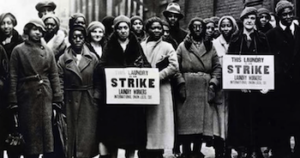
*The Atlanta washerwomen strike occurred on this date in 1881. This boycott was a washerwomen labor strike. The strike was carried out primarily by Black women who argued for increased wages and greater autonomy in their work.
Following the American Civil War, many Black women were washerwomen, also known as laundresses. More African American women were washerwomen than in any other domestic work, representing over half of their workforce. Many employed in this field made between $4 to $8 per month. That summer, several washerwomen in the city founded the Washing Society. At the first meeting, officials were elected, and a uniform rate for washerwomen was decided. While initially consisting of only 20 washerwomen, the Washing Society boasted 3,000 members within three weeks.
Society members engaged in door-to-door canvassing and garnered support from several of the black churches in the city. On July 19, the Washing Society declared a strike, demanding higher wages. Additionally, they wanted a flat rate of $1 per twelve pounds of laundry and greater work autonomy.
The course of the strike
The strike began several weeks before the International Cotton Exposition, a world's fair in Atlanta that would bring many visitors to the city. The strikers received substantial resistance from white authorities and businesspeople in the town. The Atlanta Constitution was initially dismissive of the strike, though as the strike continued, they began to acknowledge the strength of the strikers. Many strikers were arrested or fined for the strike action. The Atlanta City Council also threatened to impose a business tax on the washerwomen, and many of the strikers' landlords raised their tenants' rates. In one such case, a striker who couldn't afford to pay one of the fines was sentenced to 40 days of working on a chain gang.
Despite this, the strike continued and spurred labor disputes with other domestic workers in the city. Black waiters at the National Hotel refused to work over their wages during the strike. Five hundred women strikers met at Wheat Street Baptist Church in early August to discuss the strike. Shortly after that, on August 3, the strikers issued an ultimatum to Mayor James English, saying they would pay a license fee of $25 "as a protection so we can control the washing for the city" but would continue to strike if their demands for higher wages were not met. Following this, the city acquiesced and allowed the washerwomen greater autonomy and higher rates in exchange for a $25 license fee.
The strike ended in August with some success for the strikers. Aftermath The strike is one of several organized by domestic workers in the Southern United States during this time, preceded by strikes in Galveston, Texas, in 1877 and Jackson, Mississippi, in 1866. However, neither was larger than the Atlanta strike. In analyzing the strike's success, Hunter cited that while some washerwomen saw wage increases, many did not.
Low wages would continue to be an issue between washerwomen and their employers. Hunter also cited that a second strike was threatened during the International Cotton Exposition, though this never came to fruition. However, others have noted that the significant strike involving African American women during the early Jim Crow era demonstrated the impact of black labor, particularly domestic work in the city.